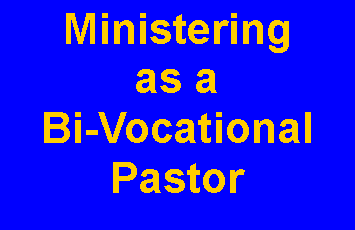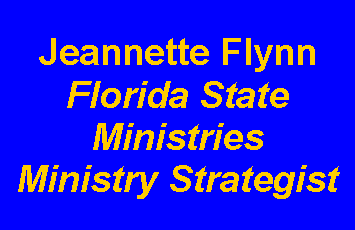


|
In the early days of pastoral ministry in America and certainly in the Church of God reformation movement, bi-vocational pastors were the norm. They shepherded small churches, and, at the same time, held full-time, salaried secular jobs. Even today, a large percentage of pastors continue to be “tent-maker” pastors.
Economics and the decline of attendance in many Church of God congregations play a large part in the increasing number of bi-vocational pastors. In a 2006 study, one faith group discovered the annual cost of supporting a bi-vocational pastor was $17,385, compared with almost $60,000 in pay and benefits for a full time minister (Mark I. Pinsky, “Your Postman May Be a Pastor,” Orlando Sentinel. Sept. 2, 2007: http://www.orlandosentinel.com/topic)
About seventy-five percent of Church of God congregations average fewer than a hundred members. That makes paying the light bill, the mortgage, and other fixed costs, providing some dollars for curriculum and ministry AND supporting a pastor almost an impossible task.
Before we begin to think that being a small church is the problem – let me hasten to testify to you that our smaller congregations are the backbone, the heart, the arms and the legs and feet of much ministry in the Church of God. The majority of our pastor candidates come from small congregations, many of our missionaries grew up in small congregations, missions around the world rests largely with small congregations who work through faith missions budgets and support Living Link Missionaries.
Bi-vocational ministers often give as sacrificially to pastor their congregations as ministers supported by a complete salary. In fact, a better distinction between “bi-vocational” and “full-time” pastors is this: Both ministers are full-time pastors, however one pastor is fully funded for their full-time work while the other is only partially funded for their full-time work!
Bi-vocational pastors have the same concerns as fully funded church pastors. But they experience different problems. There are advantages and disadvantages to being a bi-vocational minster. Bi-vocational ministers have additional opportunities and inroads to witness and minister to unchurched co-workers in their secular job. There may even be more security and stability because their salary is not dependent on the congregation’s ability to support a pastor. Additionally, secularly employed individuals often are able to find work that brings health insurance and medical benefits that even larger congregations cannot afford to provide for their pastors.
The disadvantages are rather obvious. Often the bi-vocational minister is unable to attend ministerial meetings or trainings that others can attend. Their hours of work are fairly committed and yet there is the demand of ministry for visitation; hospital coverage; sermon preparation; or even counseling. Add to that fact, many of our bi-vocational pastors also have families – spouses and children at home – the demand for their time is exasperated.
I remember one pastor explaining the time crunch this way: “There are times my secular employer isn’t understanding about my ministry demands, and the church isn’t going to be understanding about all the other time demands I face. I simply cannot be at two places at once, and both my employer and the church expect to be my first priority.”
There are far too few resources and support networks for bi-vocational pastors. If you are a bi-vocational pastor or your congregation has a bi-vocational pastor then here are a list of ideas that might help strengthen and support you and your pastor.
· CONNECT 1. Identify 3 – 4 other bi-vocational ministers to form a CLUSTER in your area and commit to meeting once a month for breakfast. Take the time to really listen to each other, share concerns from your family or your congregation, share suggestions, pray for one another. I know that feels like “one more time commitment” and while it is, you will find that instead of draining you, it will energize you, lift you and strengthen you. (God said, “it is not good for man to dwell alone!”He didn’t mean just in the sense of marriage!)
· PRAY 2. Identify 3 – 4 PRAYER WARRIORS in your congregation. Meet with them each Sunday morning before or after church for just 15 – 30 minutes. LET the prayer focus be for you as their pastor. Share with them specifics of how to pray for you as a bi-vocational pastor, share with them victories, answers to prayer, needs in your life. Let them be your rope holders.
· SANCTIFY 3. “SANCTIFY” at least 4 consecutive hours a week that are devoted to your spouse and children. No phones need to be answered, no interruptions are allowed. This is not time to watch TV together or go grocery shopping. This is genuinely “sanctified” time that you listen to each other, share with each other, pray together, laugh together, play together, invest in one another exclusively as husband and wife/parent and children.
· TRAIN 4. If you do not have a clearly identified TRAINED band of “deacons”/under shepherds - do that immediately and then TRAIN your congregation to look to them, embrace them, allow them to minister in a variety of ways. (In smaller congregations this band of deacons may only be 3 or 4 people who are equipped to visit the sick, pray with people in your congregation going through difficult times, keep you informed of the spiritual health and the well-being of everyone in your congregation; write cards and letters to each person in the church at least twice a year, etc.)
· READ 5. Determine that you will READ at least one recommended resource a month. That may require discipline on your part and your time but it will provide you with the growth and development that you may not be able to get by attending conferences. Invite three to four individuals (other pastors, professors, etc.) to give you their top five HAVE TO READ books. Choose from that list a new book each month. Each year choose new people to recommend what books you read..
Just to help you get started here are my recommendations (too many good books to narrow to just five).
Crucial Conversations: Tools for Talking When Stakes Are High by Kerry Patterson, Joseph Grenny; $10.97 from Amazon.com
Theology of Holiness and Love by Kenneth E. Jones; $13.00 Reformation Publishers
Tribal Leadership: by Dave Logan, John King and Halee Fischer-Wright: $17.63 from Amazon.com
Greenhouses of Hope: Congregations Growing Young Leaders Who Will Change the World by Dori Grinenko Baker; $18.00 from Alban Institute (www.alban.org)
The Bivocational Pastor: Two Jobs, One Ministry by Dennis Bickers; $15.99 Amazon.com
A Handbook of Christian Doctrine by Charles E. Brown: $13.00 Reformation Publishers
Emotional Intelligence: Why it can matter more than IQ by Daniel Goleman; $10.36 Amazon.com
Isaiah, Prince of Prophets by Kenneth E. Jones: $20.00 Reformation Publishers
|